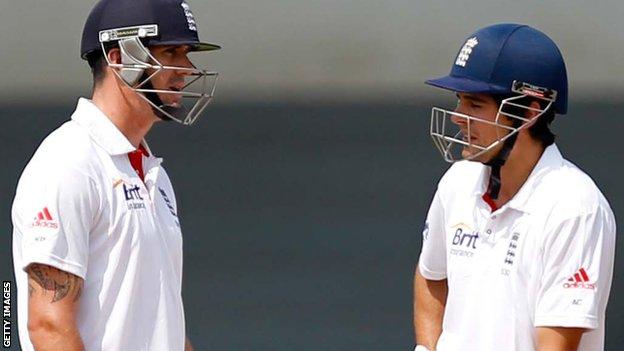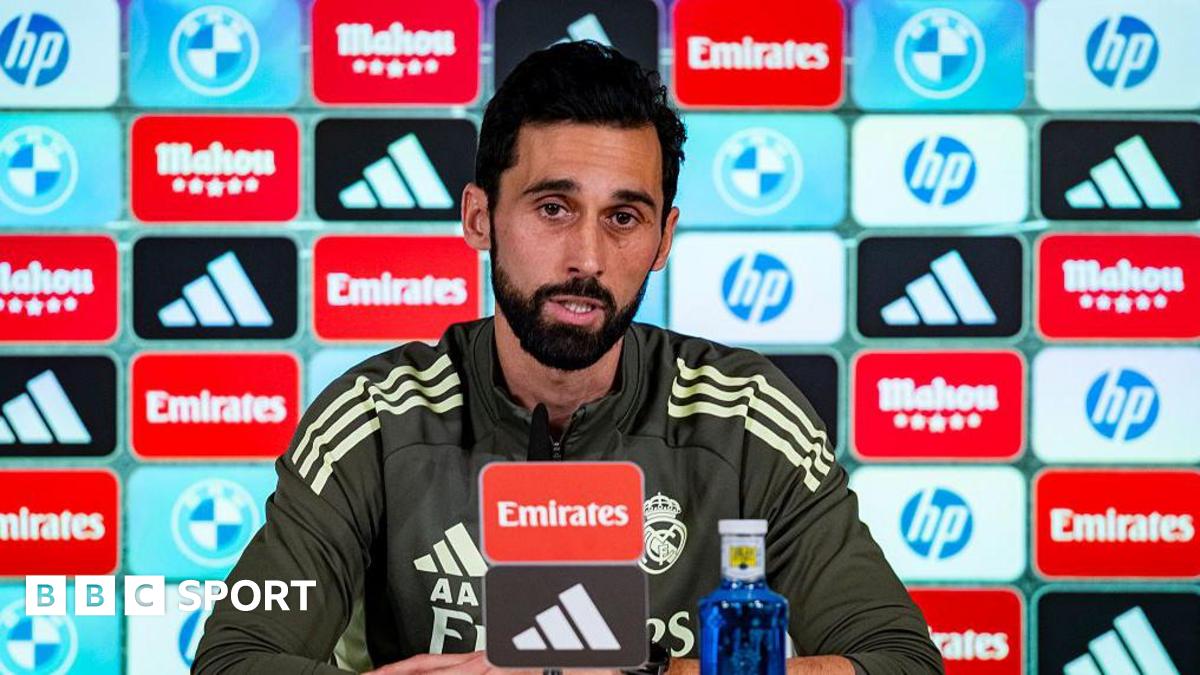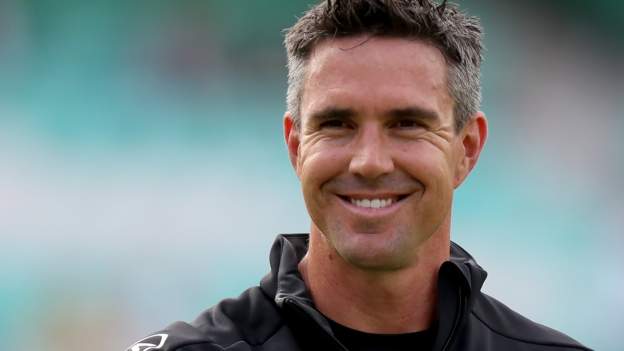It has been called one of the finest innings played by an England batsman, their greatest in an overseas Test and one of the best by a visiting player in India.
Kevin Pietersen’s sparkling 186 in the second Test in Mumbai in 2012 helped reverse the momentum after England were well beaten in the first Test, setting the tourists on the way to their first series win in India for 27 years. It remains the last time India lost at home.
It came against the backdrop of his “reintegration” into the England team following the row over text messages he sent to the South Africa team about then captain Andrew Strauss the previous summer.
In an in-depth interview for the Test Match Special podcast, Pietersen explains how he mastered Mumbai.
‘This was going to be our greatest Test’
Following the text messages row, Pietersen was dropped for the final Test against South Africa, left out of the World T20 squad in Sri Lanka and not given a central contract. A month before the India series began, it was announced that he would be reintegrated into a squad led by new captain Alastair Cook.
Pietersen: It was a big tour, one where we needed all our big players playing well. We had a strong team, a very confident team. Everybody knew what they were doing and understood their roles.
We’d raised the bar from any other England Test team I’d played in. This was going to be our greatest Test. We’d beaten Australia at home, we’d beaten Australia away, but beating India away was going to be an incredibly difficult experience.
England performed well in the warm-up games, with five different batsmen, including Pietersen, scoring hundreds. However, when it came to the first Test in Ahmedabad, they were hit by a run-a-ball 117 from Virender Sehwag and a double century from Cheteshwar Pujara before being bowled out for 191.
The opposition India made us play against in the warm-up games were like under 9s. Every single batter belted it everywhere. We all thought we were the best players to have ever toured India, then we get to Ahmedabad on a wicket that was just a flat road and the ball didn’t bounce higher than halfway up the stumps.
[Virender] Sehwag ‘Sehwags’ us and we ended up getting completely annihilated. Having experienced those conditions in the Test, we knew we were going to have to play spin much better.
Pietersen made 17 and two, bowled playing poor shots in both innings to left-arm spinner Pragyan Ojha.
I came under criticism, but this wasn’t new to me. Every time I scored runs I was good, every time I didn’t I was bad, so that wasn’t something I was too perturbed about.
I was worried about my technique at the time, wondering why I was making silly mistakes. Why were my feet not moving as much as they should be moving? Why was I not hitting the ball in the areas I practised to hit the ball?
After I got out in the second innings, I took [coach] Andy Flower and [spin bowling coach] Mushtaq Ahmed to the nets and batted with them for an hour while the match was still going on.
I hit balls for a hour, making sure I was in the right frame of mind to know what I had just done five minutes earlier in the Test wasn’t what I was going to do in the next match.
Sometimes you can walk out into the big arena and you can be a rabbit in the headlights. That happened to me often. You can get overawed by the excitement, the buzz. It can happen so quickly and then you’re out. I wanted to slow that whole process down, keep the emotion intact.
The only way I could do that was by concentrating on defence, making sure my defence against the spinners was solid. I went and practised my defence, my feet, making sure I was picking length, working on where and how I was going to hit the ball, and that is what I did in the three days leading up the Mumbai Test.
‘I knew I was going to get runs’
England showed some encouraging signs towards the end of the first Test. Cook made 176 as they followed on before the tourists succumbed to a nine-wicket defeat. In the second Test in Mumbai, England bowled India out for 327, with Pietersen joining Cook at 68-2 in reply.
The previous few days of practice in Mumbai were some of the best days I’ve had practising in an England shirt. The way that I had solved the issue of my foot movement, the way I was striking the ball, the way I was trusting my defence… I knew I had a chance of scoring runs.
There were some days when I walked out to bat and I knew I’d get runs. It was as simple as me putting my bat down and taking guard and thinking to myself ‘here we go, good luck’.
As many of those days that I had, there were others when I would take guard, ask the umpire for leg stump, look around, and think ‘oh no, jeez, this is chaos. I’m going to have to fight like anything to get myself to 10.’
In Mumbai, I felt exactly the same way as I did when I was practising, as I was playing the spinners in the nets. I knew on that day I was going to get runs. I didn’t know how many I was going to get, but it was just one of those days.

In the heat of Mumbai, the city where India legend Sachin Tendulkar learned to play, Pietersen sparkled at a packed Wankhede Stadium, dominating a third-wicket stand of 206 with Cook.
I don’t remember the conversations I had with Cooky – we always just used to say ‘well done, keep going’, the generic conversation that you have. The one thing we did always say was to make sure you kept picking the length well and run hard. That’s what we did.
He manipulated the field and bored the life out of everybody. I don’t mean that in a bad way; I mean that in a really positive way. He was able to get unbelievable miles into the bowlers while I was trying my best to do slap harry on the other side. The partnership was able to build and build like that because bowlers had to bowl in different ways to us.
‘Covering the cracks’
Pietersen’s footwork was immaculate. A big stride forward or back, sometimes a deft skip down the pitch. A reverse-sweep to reach three figures was a sign of what was to come and took Pietersen to 22 Test centuries, an England record he shared at the time with Cook, Colin Cowdrey, Wally Hammond and Geoffrey Boycott.
When they start putting those names around I feel quite weird to be a part of all that. If you look at my numbers, see the records, it just doesn’t seem real.
To hear that kind of stuff makes me feel happy and it’s great to reflect on it. The world I’m living in at the moment is so different to making Test hundreds. It feels like it was made up, belonging to someone else.
Pietersen marked his century with a raise of the bat and a hug from Cook, then unfurled some audacious strokeplay – sixes hit down the ground and on the sweep, with one imperious maximum over extra cover. When he reached 150, his raised-bat celebration was described as being like “the Statue of Liberty” by TMS commentator Henry Blofeld.
I don’t know if it felt like a reintegration. It was certainly emotional because of everything that happened. Was it just covering a lot of cracks? It turned out to be like that.
I just wanted to be batting, scoring runs and winning games for England. I think to date I still have the most, or I’m right up there for the most man-of-the-match awards for England. That is incredibly pleasing, because that is the kind of stuff where you look back and think they were match-winning performances.
I travel to India a lot and a lot of the broadcasters say it is the best innings that has ever been played by a foreigner on India soil. That doesn’t feel right or like it was me that did it. I was able to do some fun things, some cool things.
‘Not my greatest innings’
By the time Pietersen was caught behind driving at Ojha, he had put England on the way to a 10-wicket win, one that was followed up a seven-wicket victory in Kolkata and a draw in Nagpur to seal the series. He does not consider the 186 to be his greatest innings, preferring the 151 he scored against Sri Lanka in Colombo earlier in 2012.
Mentally I didn’t think I’d be able to score more than 40 or 50 in Sri Lanka. I have air conditioning going in our house in the middle of winter because I sweat so much. Coming from Durban, it’s odd to say I can’t tolerate heat, but I can’t. The humidity kills me.
To score those kind of runs, I thought it would be physically and emotionally impossible, never going to happen. I knew the only way I was going to was just swing. ‘If it’s up, it’s off’. That’s the approach I used in Sri Lanka. Scoring runs in India was never a problem; I always scored runs in India.
Pietersen was sacked by England just over a year later in the fallout from an Ashes whitewash in Australia. Now, seven years on from when he last played international cricket, he ranks the win in India among his top three moments with England.
The 2005 Ashes was amazing, winning the 2010 World T20 was amazing. Those and India 2012 are the top three.
Every single time I walked out to bat, if I knew I was in complete control of defending the bowlers’ best ball, then it would be a day when I got runs.
There were times when I played shots in my 20s or 30s and got out, and people were saying ‘why are you doing that?’ It was because in my mind I was playing so well, I could do anything.
That was how I felt on many occasions. I got criticised for stupid, reckless or careless shots, but I did it because I thought I could. I was a free spirit when I walked out to bat.
In the previous summer, against South Africa, Morne Morkel knocked my stumps out at The Oval. I thought, ‘my goodness, how am I going to score a run?’ My feet were nowhere; I was completely gone. I didn’t have my technique in order. I couldn’t defend their best ball.
In the next Test, when I scored a hundred at Headingley, I took guard, smiled and said ‘you blokes are going to get it today, because anything you bowl me I can defend’.
It’s weird. I wish I knew how to explain it. I wish I could speak to all the batters in the world and tell them how to do it.






















